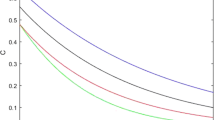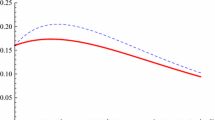Abstract
Entanglement polygamy, like entanglement monogamy, is a fundamental property of multipartite quantum states. We investigate the polygamy relations related to the concurrence C and the entanglement of formation E for general n-qubit states. We extend the results in [Phys. Rev. A 90, 024304 (2014)] from the parameter region α ≤ 0 to α ≤ α0, where 0 < α0 ≤ 2 for C, and \(0<\alpha _{0}\leq \sqrt {2}\) for E.




Similar content being viewed by others
References
Mintert, F., Kuś, M., Buchleitner, A.: Concurrence of mixed bipartite quantum states in arbitrary dimensions. Phys. Rev. Lett. 92, 167902 (2004)
Chen, K., Albeverio, S., Fei, S.M.: Concurrence of arbitrary dimensional bipartite quantum states. Phys. Rev. Lett. 95, 040504 (2005)
Breuer, H.P.: Optimal entanglement criterion for mixed quantum states. Phys. Rev. Lett. 97, 080501 (2006)
de Vicente, J.I.: Lower bounds on concurrence and separability conditions. Phys. Rev. A 75, 052320 (2007)
Zhang, C.J., Zhang, Y.S., Zhang, S., Guo, G.C.: Optimal entanglement witnesses based on local orthogonal observables. Phys. Rev. A 76, 012334 (2007)
Nielsen, M.A., Chuang, I.L.: Quantum Computation and Quantum Information. Cambridge University Press, Cambridge (2000)
Pawlowski, M.: Security proof for cryptographic protocols based only on the monogamy of Bell’s inequality violations. Phys. Rev. A 82, 032313 (2010)
Koashi, M., Winter, A.: Monogamy of quantum entanglement and other correlations. Phys. Rev. A 69, 022309 (2004)
Guo, Y.: Any entanglement of assistance is polygamous. Quantum Inf. Process 17, 222 (2018)
Osborne, T.J., Verstraete, F.: General monogamy inequality for bipartite qubit entanglement. Phys. Rev. Lett. 96, 220503 (2006)
Bai, Y.K., Ye, M.Y., Wang, Z.D.: Entanglement monogamy and entanglement evolution in multipartite systems. Phys. Rev. A 80, 044301 (2009)
Bai, Y.K., Xu, Y.F., Wang, Z.D.: General monogamy relation for the entanglement of formation in multiqubit systems. Phys. Rev. Lett. 113, 100503 (2014)
Coffman, V., Kundu, J., Wootters, W.K.: Distributed entanglement. Phys. Rev. A 61, 052306 (2000)
Zhu, X.N., Fei, S.M.: Entanglement monogamy relations of qubit systems, Entanglement monogamy relations of qubit systems. Phys. Rev. A 90, 024304 (2014)
Jin, Z.X., Li, J., Li, T., Fei, S.M.: Tighter monogamy relations in multiqubit systems, Tighter monogamy relations in multiqubit systems. Phys. Rev. A 97, 032336 (2018)
Kim, J.S.: Negativity and tight constraints of multiqubit entanglement. Phys. Rev. A 97, 012334 (2018)
Goura, G., Bandyopadhyayb, S., Sandersc, B.C.: . J. Math. Phys. 48, 012108 (2007)
Kim, J.S.: Weighted polygamy inequalities of multiparty entanglement in arbitrary-dimensional quantum systems. Phys. Rev. A 97, 042332 (2018)
Uhlmann, A.: Fidelity and concurrence of conjugated states. Phys. Rev. A 62, 032307 (2000)
Rungta, P., Bužek, V., Caves, C.M., Hillery, M., Milburn, G.J.: Universal state inversion and concurrence in arbitrary dimensions. Phys. Rev. A 64, 042315 (2001)
Albeverio, S., Fei, S.M.: A note on invariants and entanglements. J Opt B: Quantum Semiclass Opt. 3, 223 (2001)
Yu, C.S., Song, H.S.: Entanglement monogamy of tripartite quantum states. Phys. Rev. A 77, 032329 (2008)
Bennett, C.H., Bernstein, H.J., Popescu, S., Schumacher, B.: Concentrating partial entanglement by local operations. Phys. Rev. A 53, 2046 (1996)
Bennett, C.H., DiVincenzo, D.P., Smolin, J.A., Wootters, W.K.: Mixed-state entanglement and quantum error correction. Phys. Rev. A 54, 3824 (1996)
Kim, J.S.: General polygamy inequality of multiparty quantum entanglement. Phys. Rev. A 85, 062302 (2012)
Acknowledgments
This work is supported by NSFC under numbers 11675113, 11605083, and Beijing Municipal Commission of Education (KZ201810028042).
Author information
Authors and Affiliations
Corresponding author
Additional information
Publisher’s Note
Springer Nature remains neutral with regard to jurisdictional claims in published maps and institutional affiliations.
Rights and permissions
About this article
Cite this article
Zhu, XN., Jin, ZX. & Fei, SM. Polygamy Inequalities for Qubit Systems. Int J Theor Phys 58, 2488–2496 (2019). https://doi.org/10.1007/s10773-019-04139-y
Received:
Accepted:
Published:
Issue Date:
DOI: https://doi.org/10.1007/s10773-019-04139-y




